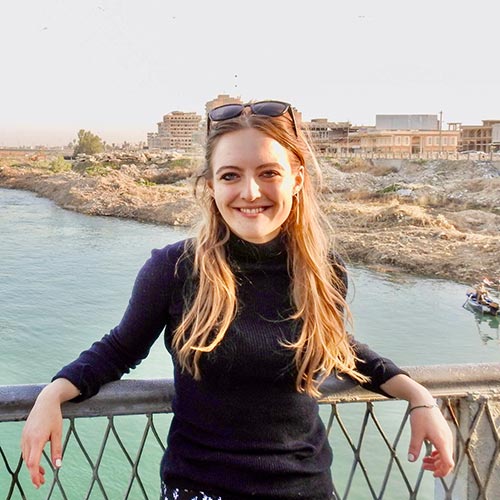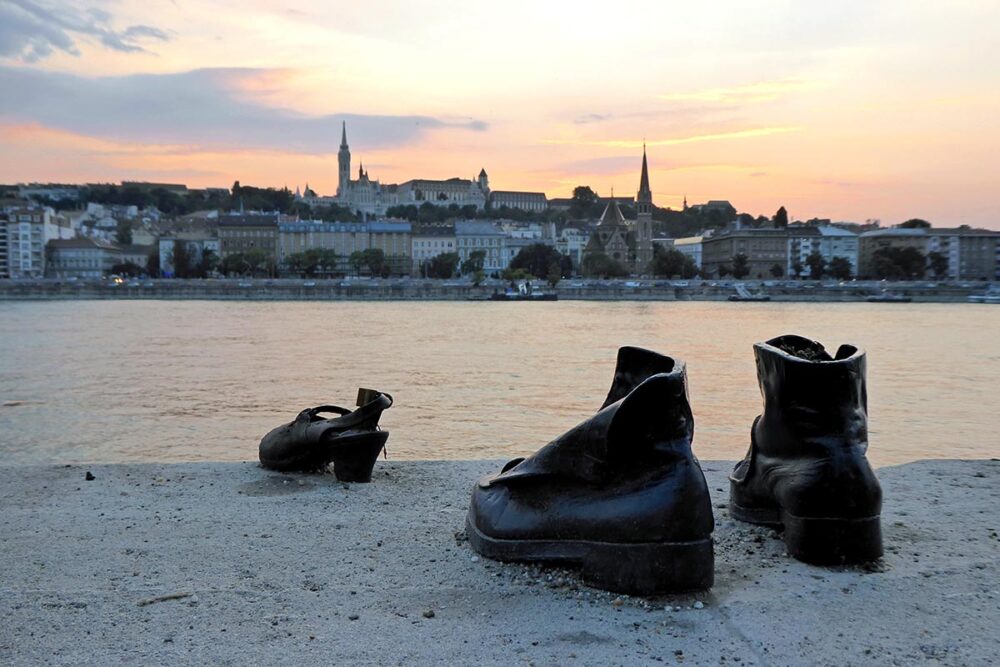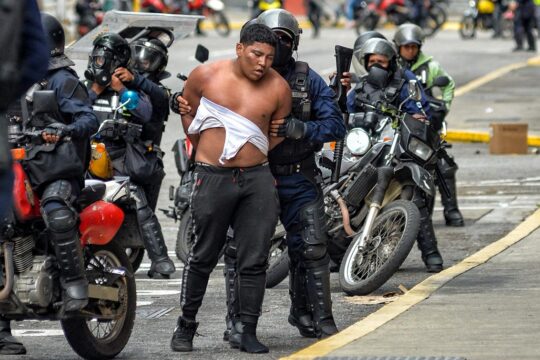In May 2025, Hungary became the first European Union member state to formally renounce its obligations to the International Criminal Court (ICC), one month after hosting Israeli prime minister Benjamin Netanyahu. Although Hungary ratified the Rome Statute in 2001 during Viktor Orbán’s first term in office, it never incorporated the treaty into domestic law. Its symbolic withdrawal, therefore, endorsed by a parliamentary vote on 20 May, has sent a political message that ripples far beyond Budapest. At first glance, Hungary’s ICC move seems like just another marker in Orbán’s increasingly illiberal rule, and part of his deepening alliance with Netanyahu’s government. But the motivations, and the near silence from other EU capitals, hints at a deeper fracture in the European commitment to international justice.
The political mood enabling a departure from the ICC is reflected on the city's streets. On posters plastered across the drive to and from Budapest’s airport, images of EU leaders and the Ukrainian president are paired with a direct appeal: “Let’s not let them decide over our heads!,” demonstrating the deep-seated scepticism of any external authority. It is this same principle of sovereignty-first that is being turned towards the ICC, allowing the withdrawal to be framed for a domestic audience through a familiar lens.
The decision coincided with an EU-funded event in Hungary’s capital that was part of the European-Palestinian-Israeli Trilateral Dialogue Initiative (EPICON), coordinated by the Berlin-based Candid Foundation. Held on 27 May 2025 the meeting welcomed six prominent Israeli and Palestinian peace activists, from law, media, civil society and religion, alongside Hungarian MPs, political officers, and other stakeholders. Together, they explored Europe’s shifting role in the Middle East post-October 7.
EPICON’s goal is to reassess the political realities in Israel and Palestine, create space for renewed engagement, and identify actionable steps for European countries to support a just solution, with events taking place across EU member states throughout 2025 aimed at informing European policy and amplifying alternative Israeli and Palestinian voices in European capitals.
A long memory of 1956 and the ICTY
Some Hungarian MPs who voted in favour of the withdrawal have based their rationale on the ICC losing legitimacy and having done little for Hungarian national interests. Candid reflections from a Hungarian opposition MP present at EPICON’s event also revealed something older: a bitterness that the West failed to intervene during the Soviet suppression of the 1956 uprising. “We learned then that international law does not protect us,” another participant explained. That sense of abandonment still seems to shape attitudes today.
There’s also broader mistrust of international criminal tribunals. Many Hungarians see the ICC as a continuation of the International Criminal Tribunal for the former Yugoslavia (ICTY), widely criticised by many present as being inefficient and politically selective. The legacy of the ICTY lingers, not just in Hungary but across Central and Eastern Europe, where it is remembered as an instrument of victor’s justice, selectively applied, and as a warning against external judicial intervention.
Péter Szitás, Senior Research Fellow at the Danube Institute, a national-conservative think tank in Budapest that is closely aligned with and receives funding from the Fidesz government, explains that Hungary’s exit should be read not as a rejection of accountability per se, but more of selective enforcement. “The Hungarian Government maintains that the ICC has become a politically motivated body and emphasises that the exercise of criminal jurisdiction is a core component of state sovereignty,” he explained while attending the EPICON discussion. “However, the Hungarian Parliament has never transposed the Rome Statute into domestic law, which means that the national legal framework necessary for the arrest and extradition of individuals wanted by the ICC is currently lacking. Consequently, Hungary’s withdrawal from the ICC would not result in any practical changes.”
Szitás points to the disillusionment: “Recent unpunished violations of international norms, such as the unlawful bombing of Yugoslavia [in 1999 by NATO forces] or the similarly unlawful war in Iraq [in 2003 by the U.S.], serve as more pertinent examples of why many around the world have become disillusioned with international law. As long as there remains a possibility that the international tribunals will act assertively against certain actors while being lenient or even paralysed in the case of others, it is legitimate to question whether their ultimate aim is genuinely to uphold the rule of law, or rather to serve specific political interests,” he argues. “When the West violated the very rules it had established [in the 1990s and 2000s], it effectively encoded future breaches of norms into the international system.”
A staunch ally of Netanyahu’s Israel
Yet Szitás also offers a nuanced view on Hungary’s sovereignty-oriented foreign policy, on which the Danube Institute is known for: “It must also be acknowledged that, even as a matter of formal logic, it is in the relative interest of smaller states to maintain the primacy and enforceability of international law, given that – lacking hard power – these countries find it difficult to assert their international interests by other means,” he added.
This withdrawal cannot be separated from the wider political moment as the ICC is reportedly preparing further arrest warrants related to the war in Gaza. Along the Danube, the memorial of iron shoes honouring Jewish victims of Hungarian fascist terror is haunting. It also creates a complex backdrop for the government’s current diplomacy. In Budapest today, in contrast to many other European cities, posters calling for the release of Israeli hostages remain visible. Hungary is one of Israel’s strongest regional allies and has consistently slammed the Court’s supposed anti-Israel bias. Withdrawal now seems like pre-emptive shielding, for itself and its allies.
“Immediately following the issuance of the ICC arrest warrant against Benjamin Netanyahu, Prime Minister Viktor Orbán extended an official invitation to the Israeli Prime Minister for a state visit to Hungary,” Szitás explained. “Their meeting in Budapest was unquestionably demonstrative in nature: two strong leaders jointly signalling to the world that they are autonomous actors who do not recognise the jurisdiction of international legal bodies over themselves,” he said. “This message was reinforced by a phone call during which the President of the United States also briefly joined the two premiers.”
Fighting the manipulation of trauma
That posture jarred with the tone inside the EPICON conference. There, the conversation turned to the deeper drivers of the conflict, and the need for healing. Talia Goshen, a Tel Aviv-based humanist rabbi, began by diagnosing what she called the “deep moral wounds” that societies carry from collective traumas like genocide and injustice. Left unhealed, she explained, these wounds “fester into fear, defensiveness, and cycles of violence.” She described contemporary Jewish society as one “profoundly shaped by centuries of exile, pogroms, exclusion, anti-Semitism, and of course the Holocaust,” making it bear its wounds with a “heightened sensitivity to existential threat.”
The danger, Goshen warned, is when this trauma is manipulated. “When these traumas are not met with shared values like justice, dignity, equality and mutual accountability, they can be manipulated by the dangerous 'virus' of supremacy – the belief that one’s pain justifies moral exceptionalism or domination over others.” She argued that, “the current fanatic Israeli government exacerbates these wounds by invoking historical trauma to justify policies of occupation, systemic inequality, and violence,” a process she described as “turning a legacy of suffering into a rationale for the oppression of another people.”
Looking across the table at a fellow participant, Goshen highlighted the inequality of their lives. “We land in Tel Aviv as equals,” she said, “but one of us lives under civilian law, and the other under military law.” Highlighting the reality Goshen described, Mohammed Daraghma, a veteran Palestinian journalist, offered a sharp analysis of the politics driving the injustice Goshen described, and the growing alliance between the Israeli and Hungarian leadership.
“I believe the Hungarian president is one of those so-called ‘friends of Israel’ who, in reality, make enemies unnecessary,” Daraghma added in a follow-up conversation, commenting on the long-term consequences of the destruction. “He supports settlement expansion, the undermining of the two-state solution, and war crimes – none of which serve Israel’s interests. Settlements eliminate the possibility of a political solution and create a one-state reality based on apartheid, which will ultimately harm Israel in the long run.”
EPICON featured several other Palestinian and Israeli thinkers who continue to believe in people-to-people dialogue, even as political horizons narrow. The erosion of faith in legal institutions, they say, could also be an opportunity to reinvest in grassroots, transnational networks. International justice doesn’t begin in The Hague, rather it begins where people are. “In a region where legal and political institutions frequently fail to deliver justice or equality, we believe deeply in the power of shared storytelling to build bridges,” Goshen explained, after the conference. Across Europe and the Middle East, civil society actors are filling the vacuum left by state paralysis. At EPICON, there was a shared recognition that local legal mobilisation and transnational solidarity might now offer more traction than international treaties alone. It was a rare space in which individuals with radically different experiences could sit side by side and discuss what justice could still mean.
The EU’s shrinking moral authority
Hungary’s decision also says a lot about Europe’s own drift. The EU has long styled itself as a defender of the rules-based order, but its response to Gaza has been fractured and, in places, hesitant. While countries like Ireland and Norway have urged strong ICC engagement, others have wavered. Hungary went further by cutting ties entirely.
The fact that this hasn’t prompted much pushback from fellow EU states is telling. If the bloc won’t defend the ICC (even symbolically), how can it claim to back international law? Hungary is not alone in its selective relationship with international criminal law. Other states, including Israel, Russia, and the United States, have refused ICC jurisdiction or actively opposed its investigations. However what makes Hungary’s move all the more controversial is its EU membership. Unlike those countries, Hungary is part of a bloc that claims to uphold international legal standards.
This selective morality was not lost on the conference participants. As Goshen noted, Europe’s standing as a “global champion of ‘peace through justice’” has been eroded by inconsistency. “If Europe is to lead on justice, it must apply its principles universally – not just when politically convenient,” she urged.
In this context, she framed Hungary’s defiance of international courts as dangerously short-sighted. “While the ICC is undeniably politicized and not free from bias, it remains the only existing international legal mechanism with even a limited capacity to address war crimes. Undermining it in moments of crisis sends a message that power supersedes justice, further fuelling cycles of impunity and suffering.”
Another target behind the ICC: the EU
In this light, Hungary’s withdrawal from the ICC is not just symbolic, rather it’s strategic. According to Szitás, Hungary’s objective is not to reform international public law. “Instead, what appears to be a more explicit and declared goal is to ensure that the functioning of the European Union – particularly that of the European Commission – adheres to the founding treaties. At present, this is not the case: the Commission is increasingly shifting away from its role as guardian of the treaties and assuming a governmental function, which runs counter to the interests of the Member States”, he continued. “Nevertheless, the Orbán government, backed by a stable political mandate, is in a position of sufficient strength to draw attention to these anomalies and to articulate its objections to such developments. At the same time, it would be a shame to deny that there are marked political fault lines in the country, especially in intellectual circles. The divide between the national and progressive camps is growing ever deeper, making it increasingly difficult to engage in meaningful, constructive debates on issues such as a country’s place in the world, the state of democracy, or questions of the rule of law.”
Perhaps, then, the better question is not whether the ICC can survive Hungary’s departure, but whether Europe’s commitment to international justice can survive its silence.

Alannah Travers is a postgraduate at SOAS, University of London, specialising in the intersection of International Humanitarian Law, Human Rights and Islamic Law. She was previously based in Iraq, working with the Coalition for Just Reparations (C4JR) on the implementation of Iraq’s 2021 Yazidi Survivors’ Law and the closure of UNITAD. As a journalist and researcher, Alannah was awarded the Fetisov Journalism award in Excellence in Environmental Journalism for her reporting on gas flaring and is the Silver winner of the United Nations Correspondents Association 2023 Elizabeth Neuffer Memorial Prize.






